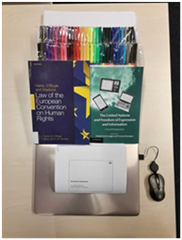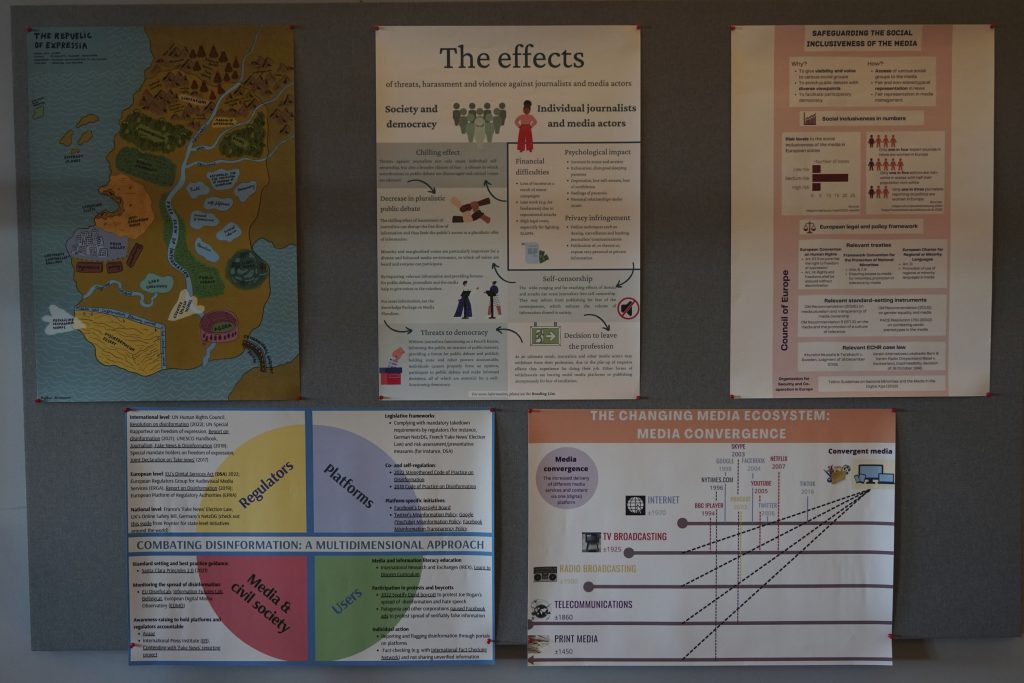
Introduction
Welcome to the webpage of the International Media Law, Policy & Practice (IMLPP) course. IMLPP is an elective module within the specialized Information Law (Informatierecht) LL.M. programme offered by the Institute for Information Law (IViR), Amsterdam Graduate School of Law, University of Amsterdam. Prof. Tarlach McGonagle designed the course in 2010 and it has been running uninterrupted since.
Course content
There is no doubt that the media are very influential actors in modern society. Their ability to spread information and ideas very widely and speedily, and to provide a forum for discussion, gives them a crucial place in democratic society. More specifically, they can enhance the quality of debate on matters of public interest and make such debate accessible for a broad range of individuals and groups. On the other hand, the media are often accused of abusing their power, by presenting material in a false, distorted, biased, sensationalist or offensive manner, or by excluding certain interests and opinions.
International media law and policy have no choice but to engage with these tensions between the ideals and realities that define media activities in practice. They seek to create an environment in which the media can fulfil their democratic tasks without political or other interference, and promote various public interests. They also seek to keep the media in check. This course introduces and explains a selection of key theories of media freedom and regulation, as developed in legal and non-legal academic disciplines, in particular communication sciences and journalism studies. It presents and examines leading European and international legal standards governing media activities. Different types of media (e.g. public service, commercial, local, community, transnational) have different objectives, which are reflected in law and policy approaches and in practice. The course also offers specific focuses on selected aspects of media freedoms, responsibilities and activities: human rights aspects; journalistic aspects; socio-cultural aspects; epistemic aspects; and technological and economic aspects.

The changing nature of the media and the growing dominance of platforms are cross-cutting themes: legal issues arising from the “new” media phenomenon are addressed throughout the course.
Academic research is a central component of the course. In addition, as part of the Amsterdam Law Practice (ALP) Programme, the course places central emphasis on experiential learning – ‘learning by doing’. All students taking the course choose a practice-oriented role. In their chosen roles, they apply their substantive knowledge of media law and policy by using communicative, decision-making, negotiating, presentational and other skills that they will need in a range of professional settings. The students also reflect on the roles they have carried out.
Intended learning outcomes
On successful completion of this course, students are able to:
- apply their knowledge of international legal standards governing the media to the concrete facts of real/fictitious cases;
- assess the extent to which key principles of media freedom and regulation are reflected in international standards;
- compare, contrast and critically analyse different regulatory and policy approaches to selected themes;
- evaluate the range of public-interest priorities that influence law- and policy-making, as well as relevant practice;
- identify shortcomings in the existing international framework for media regulation and recommend suitable strategies for addressing them;
- carry out various roles that typically arise in policy-making (and policy-implementation) processes and reflect critically on the communication strategies and techniques that are appropriate and effective for those roles, as well as the ethical values that should guide them in those roles.
For more formal information about IMLPP, see the relevant pages in the University of Amsterdam’s Study Guide: 2022-23; 2023-24.
Educational methods
The course employs several so-called ‘deep-learning’ techniques, to enhance students’ learning experiences. This approach helps students not only to deepen their academic specialization in the topics covered during the course, but also to develop and further sharpen a range of skills that will help them to apply their deepening specialization in practice. Participating students are given the opportunity to provide some input into the design of the course. The interactive seminars involve a mix of individual and collective activities.
The course seeks to harness technological innovation for educational purposes. For years, a weekly Twitter-based assignment was used to help students to curate their own IMLPP news feeds.
We also use the online platform of the Council of Europe’s HELP (Human Rights Education for Legal Professionals) Programme, for autonomous, asynchronous learning (eg. the courses on freedom of expression and hate speech) and as a resource for an interactive classroom seminar (the course on the protection and safety of journalists). The versatility of HELP courses for university education are outlined in this promotional video.
Experiential learning
The course is thus very much at home in the Amsterdam Law Practice (ALP) programme. The ALP programme is a faculty-wide initiative that places (simulated) professional experience and self-reflection at the heart of its educational vision. This means that the course design integrates practice-oriented activities and students reflect on how they perform those activities and what they learn from them.
Students are required to take on a variety of professional roles that typically feature in policy cycles, e.g. as policy-makers, strategists or advisors (problem identification, goal-setting, process-design, formulation and communication of law and policy recommendations, etc.) and as legal counsel.
During the course, students write academic research papers and blogposts; they make infographics and participate in simulations of, for example, a current affairs talk-show (a moderated discussion in which the studio guests reflect on legal and ethical aspects of journalistic and media freedoms) and an editorial meeting at The Guardian (two students moderate a discussion of selected controversial cartoons, weighing up the legal and ethical arguments about whether or not to publish). Other classroom activities include analysing media framing and manipulation and legal academic copy-editing.
Students may also choose to conceptualize and organize conference panels, argue tooth and nail in media law moot court competitions, or make podcasts.
The course culminates in an annual closing event, usually a one-day conference and a moot court competition (presided over by a professional judge and/or practising lawyers). The student who is voted ‘best oralist’ in a moot court is invited back as a judge the following year.
Conferences
The annual IMLPP conference is organized by the students and it brings together students, academics, lawyers, policy makers, civil society and journalists. The main aim of the conference is to provide IMLPP students with a podium to present the research that they have carried out during the course, alongside leading experts from academia and practice. The students work in pairs, conceptualizing and teasing out their assigned panel themes; identifying and inviting suitable experts; and taking care of conference management and PR.
Podcasts
IMLPP students are increasingly interested in the course role of organizing and recording their own podcasts on various topics discussed during the seminars. The students who choose this option are given a training session by colleagues from ICTO (technical and editing skills) and Faculty’s Teaching and Learning Centre (didactic aspects). The format of the training is interactive and hands-on: the instructors and students make a podcast about making a podcast. The students then work in pairs, conceptualizing and teasing out their chosen topics; identifying and inviting suitable experts; and booking the podcast studio for the recording. They work with semi-structured scripts and incorporate space for the experts’ own suggestions and insights.
Blogposts
Blogposts are often considered a more accessible and more engaging genre of writing than academic papers. Students write their own academic blogposts on a designated IMLPP topic as one of the graded assignments. The assignment involves prior reflection on the features of a good academic blogpost in the field of IMLPP. In 2023, the students will bundle their blogposts as an e-book. Watch this space!
Infographics
Legal visuals and visual literacy are increasingly being used to explain complex systems and concepts in academia and in law and policy contexts. Conscious of the growing relevance and importance of such visualization approaches, the course gives students an initial exposure to these topics in one of the early assignments. The assignment involves prior reflection on, and experimentation with, data visualization techniques and the basic principles and techniques of graphic design. The students work in small groups to make infographics showing and clarifying different aspects of the right to freedom of expression and media freedom and regulation.


Publications and presentations
IMLPP students regularly contribute to publications and presentations on the topics they have studied during the course, including for intergovernmental organisations such as the Council of Europe, European Union (European Parliament), Organization for Security and Co-operation in Europe (Office of the Representative on Freedom of the Media) and UNESCO. You can find an overview of these contributions here.
Student edition of Mediaforum
In 2021, a number of students chose the role of collectively drafting a project proposal for the first-ever student edition of Mediaforum, the leading national media law journal in the Netherlands. The aim was to create a publication outlet for (master’s) students’ high-quality research papers and theses on different aspects of media law and freedom of expression. The project proposal was approved by the editorial board of Mediaforum and the student editorial team evolved, reinforced by students from the elective course, Mediarecht en informatiesamenleving, on the Staats- en Bestuursrecht LL.M. Programme at Leiden Law School. The team got to work, put out a call for papers and set up a double-blind peer-review process for the submitted articles. The first edition is due to be launched at the Studiemiddag of the Vereniging voor Media- en Communicatierecht (VMC) on 23 June 2023.
Photo gallery
For an impression of some of the course’s various activities, especially the annual closing events (link will follow).
Beyond IMLPP
Experiences in the IMLPP course have inspired a number of spin-off projects/initiatives, including: